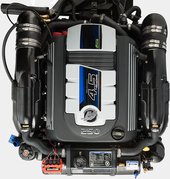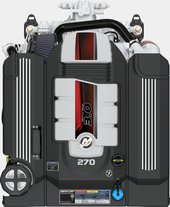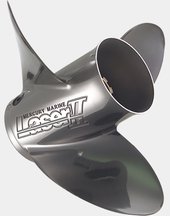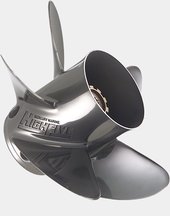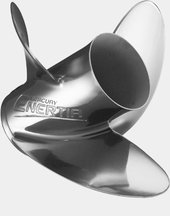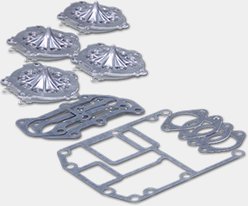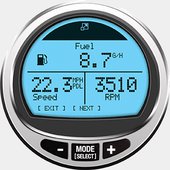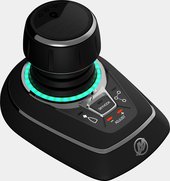
Kevin Estrada: From Pro Hockey Player to Pro Sturgeon Guide
Mercury Pro Team member’s journey takes him from slap shots to successful white sturgeon guide and conservationist.

Avid anglers know that trophy fish come in all shapes and sizes. And while everyone’s got their favorite fish, it’s fair to say that respect from fellow anglers is earned by those who truly excel at catching any species. From bass to marlin and drum to tuna – in any hue, pattern and waterway – a great angler is a great angler and is recognized as such.
Odds are – unless you happen to be from the Pacific Northwest of the United States or the Canadian Pacific coast – you may never have encountered a white sturgeon, let alone hooked one, and you may not be close enough to the niche discipline to name a great sturgeon angler.
Well, get ready to broaden your spectrum of angling appreciation because Mercury Pro Team member Kevin Estrada knows white sturgeon like few people do, and it’s his business and passion to help others catch them.
As a sturgeon guide, Estrada is a master at finding and catching one of the largest, yet least well-understood, freshwater fish species in the world. This species inhabits the eastern Pacific Ocean from Mexico to Alaska and as far inland as Montana, but is more commonly seen in the rivers and estuaries from Monterey, California, to upper British Columbia. Often called a primitive or prehistoric fish, the white sturgeon has seemingly remained unchanged for tens of millions of years and is best known as the source of some of the finest caviar in the world, though collection of caviar roe from wild populations is illegal in the United States and Canada.
It’s also known for its extreme longevity and its immense size relative to practically any freshwater fish on the planet, particularly in North America. Individuals have been known to grow longer than 10 feet in length, tip the scales at more than 1,000 pounds and live more than a century. They are modern-day dinosaurs, really, and they remain more foreign to most of us than a T-rex.
Estrada, 40, lives in the Fraser River Valley, just north of Vancouver, British Columbia, and owns and operates Sturgeon Slayers guide service on the Fraser River, one of the most sturgeon-rich waterways in the world. Don’t let the name fool you, however: Sturgeon Slayers is a strictly catch-and-release guide service as required by Canadian law and goes to great lengths to ensure that every fish caught is recorded and released with as little stress as possible. Estrada himself spends some 200 to 250 days a year on the water guiding clients, and he also employs two to five additional guides as needed to accommodate higher demand.
“It’s a pretty big industry here,” Estrada said. “It really started about 30 years ago, and it’s catch and release only, so the Fraser River has become kind of the mecca of wild white sturgeon fishing; it’s not hatchery stocked like a lot of other spots. People come from around the globe, and there are quite a few companies guiding them.”
And while many fishing guides are born to the trade and never imagined themselves doing anything else, Estrada’s first calling was hockey. After a storied youth career in his native British Columbia, he attended Michigan State University in Lansing, Michigan, on a full scholarship, where he received the Provost’s Award for Freshman Student-Athlete of the Year for the 2001-02 season. In 2001, he was drafted by the Carolina Hurricanes of the National Hockey League in the third round with the 91st overall pick, though he stayed and finished his college career at MSU. After graduating college in 2005, the up-and-coming forward spent several years on NHL developmental league teams and spent two years playing in Europe, paying his dues and honing his skills. He spent the 2008-09 season with a club in Denmark, where he was named team captain, led the team in points and was seemingly poised to finally reach the highest levels of the sport.
But then in an instant, his NHL dreams were dashed. Estrada was a passenger in a small float plane when it crashed into a lake while attempting to land in June 2009. The accident left him with neck, shoulder and knee injuries that sidelined him for 19 months. Estrada recovered enough to play for two more seasons, but after multiple surgeries and frustrating attempts to regain his old form, he was ultimately forced to accept the fact that his hockey career was over.
“As a person working a desk job it might be different,” Estrada said. “But as an athlete you need everything to work properly, and it was just too much to come back from.
“It would have been nice to have a few more years in hockey, but such is life.”
Fortunately, Estrada grew up with a love of the outdoors and was introduced to sturgeon fishing at the age of 15. As part of a business class at MSU, he had written a business plan for a fishing guide business – a plan that he implemented in 2008 when he started Sturgeon Slayers, guiding clients as a side hustle in the hockey offseason – so he already had his next career in mind when he finally hung up his skates for good. After the 2012-13 season, he did just that and returned to his beloved British Columbia and started working as a full-time professional sturgeon guide. In addition to guiding clients, Estrada has become a vocal and avid white sturgeon advocate and conservationist.
“We’re a conservation-based business, and we do a lot of the science and data collection on the fish to learn how to best protect them in the future,” Estrada said. “I’ve been on the board of the Frasier Valley Angling Guides Association for about 12 years now. That’s an organization that advocates for sustainable tourism, so we’re working with three levels of government – First Nations, provincial and federal – to make sure we’re doing things right in our fishery.”
And lest you think that the group is just there to serve the guides, think again. According to Estrada, FVAGA members work hand in hand with scientists to not only sustain the fishery, but more importantly to help the world better understand the species that the members rely on for their livelihoods.
“In that organization we hold the highest priority project of the province, which is the juvenile sturgeon monitoring and assessment program,” he said. “It’s funded by an organization called the Habitat Conservation Trust Foundation. It’s a five-year project to do research on juvenile sturgeon to learn where we can find them, what’s the recapture rate, how many we’re tagging, what’s their growth rate, and so on and so forth.
“It’s an important project because it’s estimated that our sturgeon fishery is worth upward of $100 million a year to the province. So the economic impact from tourism, including restaurants, hotel stays and everything like that, is quite significant.”
Estrada is married to Mariko Izumi, daughter of Wayne Izumi and niece of Bob Izumi, two legendary Canadian anglers who produced and hosted the “Real Fishing” television show. Mariko grew up around the show and is rather famous in her own right as host of the fishing show “Hookin’ Up.” Estrada and Mariko have a daughter, Yale (5), and son, Tiger (3), who are growing up immersed in the family’s fishing, travel and business activities.
As part of his day-to-day guide activities, Estrada, like many other leaders of the Fraser River fishing community, logs every single sturgeon that is caught by his clients. This includes recording the tag number (or adding a tag if the fish has never been caught and tagged before), as well as the length and girth and the location the fish was caught. When the fish is a juvenile and therefore small enough to safely handle, the weight is recorded also. According to Estrada, all this helps biologists fill in the gaps that still exist in the collective knowledge of the species. For instance, sturgeon are known to live for an exceptionally long time, but no one really knows how long. Where sturgeon spend their lives is also a bit of mystery. Of course, they can often be found in the Fraser River and many other rivers on the West Coast of North America, but they also can be found in saltwater on occasion, and in a few cases individuals that were tagged in Canadian rivers have shown up a decade or two later as far away as California waterways.
And while Estrada is clearly an advocate of sturgeon conservation and research, he makes his living helping people catch them, and he’s no slouch at that either. Case in point, in August 2021 he helped a team of clients land what he believes to be the largest white sturgeon ever caught.
“In all the research I’ve done it’s the largest in the world for white sturgeon,” he said. “It was 11 feet, 6 1/2 inches to the fork in the tail. In the U.S., they measure them by total length, so it’s hard to compare it to a fish in, like, the Columbia River because it’s not standardized.
“It’s the biggest [in Canada] for sure, and the only other spot white sturgeon get that big is the Columbia River. And the biggest I can find there was 11 feet, 6 or 8 inches in total length, which means that it was likely around 11 feet or high 10s to the fork.”
Sturgeon Slayers clients Jake Drieger and Pete Peeters (a former NHL goalkeeper) took turns on the rod, supported by boatmates Bryant and Barry Bowtell, and the measurements were witnessed and verified by another professional guide and a local angler who were in the area. The pectoral girth was 55 inches, which means the fish’s weight may have exceeded 1,000 pounds. The fish was 2 1/2 inches longer than the previous British Columbia record white sturgeon.
“I’ve had some reporters and other people check into it as well, and ours was the biggest they could find, too,” Estrada said. “Unfortunately, the Guinness Book of World Records doesn’t have a template on verifying something like this so I can’t go to them, but it’s something we’re pretty proud of.
“It was just magnificent, and it was a virgin fish – never tagged. So we tagged it and turned it loose, and hopefully another day somebody else will see him again or we’ll get a chance to catch him again.”
To learn more about Kevin Estrada, check out the Sturgeon Slayers website, and follow him and Mariko Izumi on Instagram.


